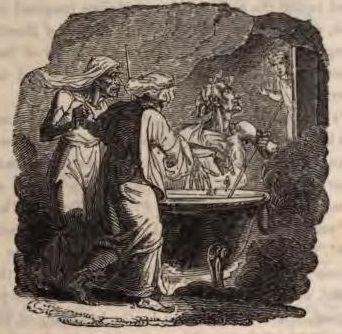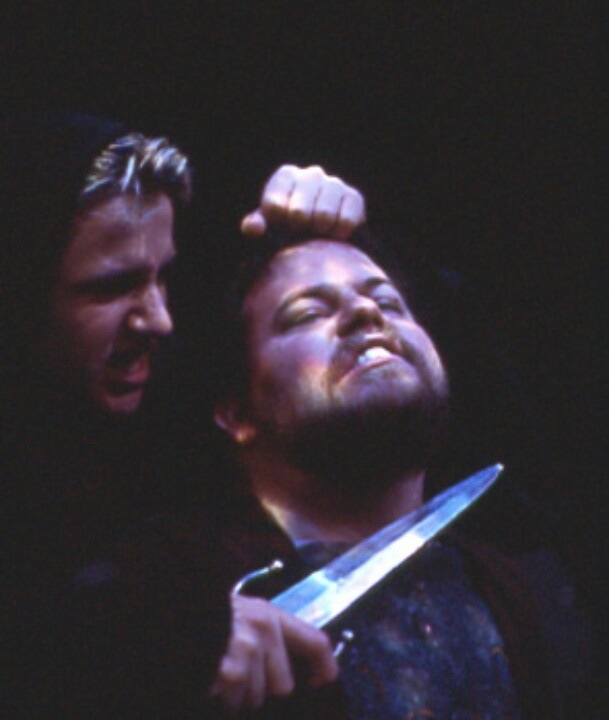

When Macbeth’s political transgressions are revealed, Scotland’s dire situation immediately registers, because the transgressions of state have been predicted by the disturbances in nature. In place of the dramatization of Macbeth’s acts of despotism, Shakespeare uses the scenes involving supernatural elements to increase the audience’s sense of foreboding and ill omen. Here, the appearance of Banquo’s silent ghost, the reappearance of the witches, and the introduction of the goddess Hecate all symbolize the corruption of Scotland’s political and moral health. Throughout Macbeth, as in many of Shakespeare’s tragedies, the supernatural and the unnatural appear in grotesque form as harbingers of wickedness, moral corruption, and downfall.

Only with Macbeth’s demise, we realize, can any kind of moral order be restored to Scotland. We know that there is nothing to stop Macbeth’s murder spree except his own death, and it is for that death that the audience now waits. Unlike Hamlet, in which the plot seems open to multiple possibilities up to the final scene, Macbeth’s action seems to develop inevitably. The play now builds inexorably toward its end. Each murder Macbeth commits or commissions is intended to bring him security and contentment, but the deeper his arms sink in blood, the more violent and horrified he becomes.īy the start of Act 3, the play’s main theme-the repercussions of acting on ambition without moral constraint-has been articulated and explored. The language that they use is fraught with imagery suggestive of suspicion, paranoia, and inner turmoil, like Macbeth’s evocative “full of scorpions is my mind, dear wife” (3.2.37). But as husband and wife begin to realize, nothing is “done” whatsoever their sense of closure is an illusion.īoth characters seem shocked and dismayed that possessing the crown has not rid them of trouble or brought them happiness. “What’s done is done” (3.2.14), she says wishfully, echoing her husband’s use of “done” in Act 1, scene 7, where he said: “If it were done when ’tis done, then ’twere well / It were done quickly” (1.7.1–2). Just as he begins to echo her earlier statements, she references his. It is difficult to believe that the woman who now attempts to talk her husband out of committing more murders is the same Lady Macbeth who earlier spurred her husband on to slaughter.

While her husband grows bolder, Lady Macbeth begins to despair-“Naught’s had all’s spent,” she says (3.2.6). Yet, despite his displays of fearlessness, Macbeth is undeniably beset with guilt and doubt, which he expresses in his reference to the “scorpions” in his mind and in his declaration that in killing Banquo they “have scorched the snake, not killed it” (3.2.15). Now he is the one reminding her to mask her unease, as he says that they must “make faces visors to hearts, / Disguising what they are” (3.2.35–36).

She told him earlier that he must “look like the innocent flower, / But be the serpent under’t” (1.5.63–64). In the scene with Lady Macbeth that follows, Macbeth again echoes her previous comments. He questions their manhood in order to make them angry, and their desire to murder Banquo and Fleance grows out of their desire to prove themselves to be men. As he talks to the murderers, Macbeth adopts the same rhetoric that Lady Macbeth used to convince him to murder in Act 1, scene 7. Macbeth and his wife seem to have traded roles. But, as Fleance’s survival suggests, there can be no escape from the witches’ prophecies. Now that the first part of the witches’ prophecy has come true, Macbeth feels that he must kill his friend Banquo and the young Fleance in order to prevent the second part from becoming realized. He seems to have gotten used to the idea, as by this point the body count has risen to alarming levels. After his first confrontation with the witches, Macbeth worried that he would have to commit a murder to gain the Scottish crown.


 0 kommentar(er)
0 kommentar(er)
